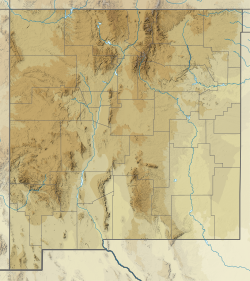Top Qs
Timeline
Chat
Perspective
Exeter Sandstone
Geologic formation in New Mexico, United States From Wikipedia, the free encyclopedia
Remove ads
The Exeter Sandstone is a geologic formation exposed in northeastern New Mexico.[1] Its age is poorly controlled, but it is thought to have been deposited during the middle Jurassic.[2]
Remove ads
Description
The formation consists of up to 24 meters (79 ft) of white to pale pink crossbedded quartz sandstone. It unconformably overlies the Sheep Pen Sandstone and is in turn overlain by the Bell Ranch Formation.[1] The Exeter Formation varies greatly in thickness, with the maximum thickness in synclinal valleys of the underlying Dockum Group and the formation being absent on some anticlinal crests of the Dockum Group.[2]
The formation has long been thought to have formed in the eastern part of the Entrada Formation dune sea and thus to be correlative with the Entrada Formation,[3][4] and Spencer G. Lucas and coinvestigators recommended demoting the Exeter Sandstone to member rank within the Entrada Formation.[5] However, age control is poor on the Exeter Sandstone,[2] and other investigators have retained the Exeter Sandstone at formation rank until the correlation becomes clearer.[6][2]
Remove ads
History of investigation
The formation was first named by W.T. Lee in 1902 for exposures near the Exter Post Office.[7][8]
See also
Footnotes
References
Wikiwand - on
Seamless Wikipedia browsing. On steroids.
Remove ads



